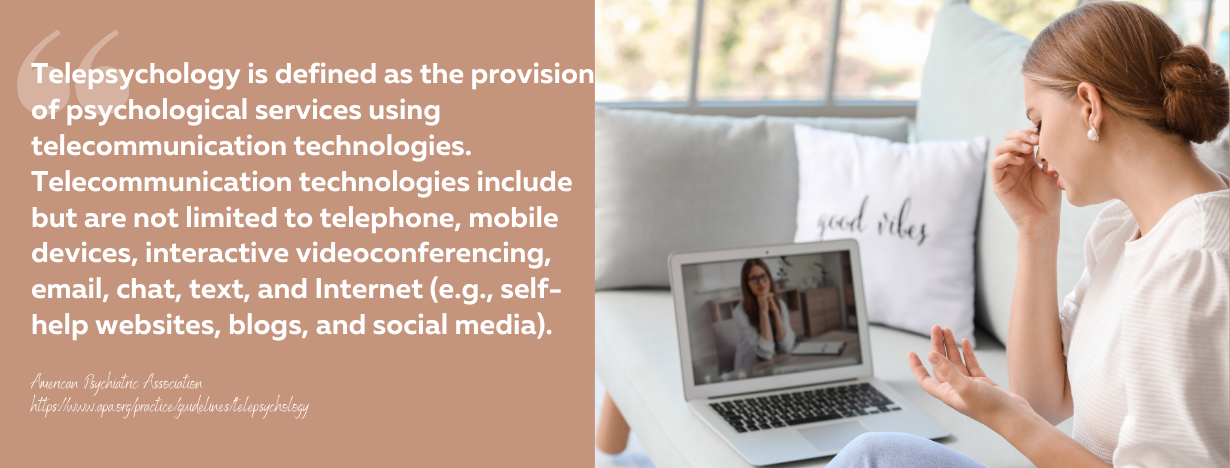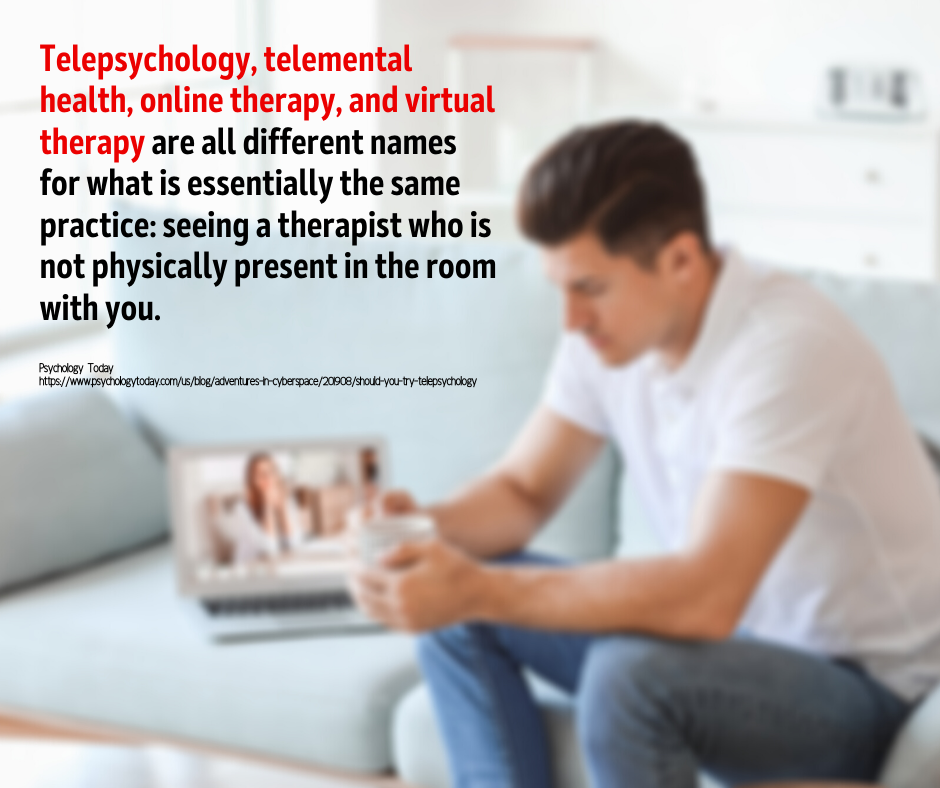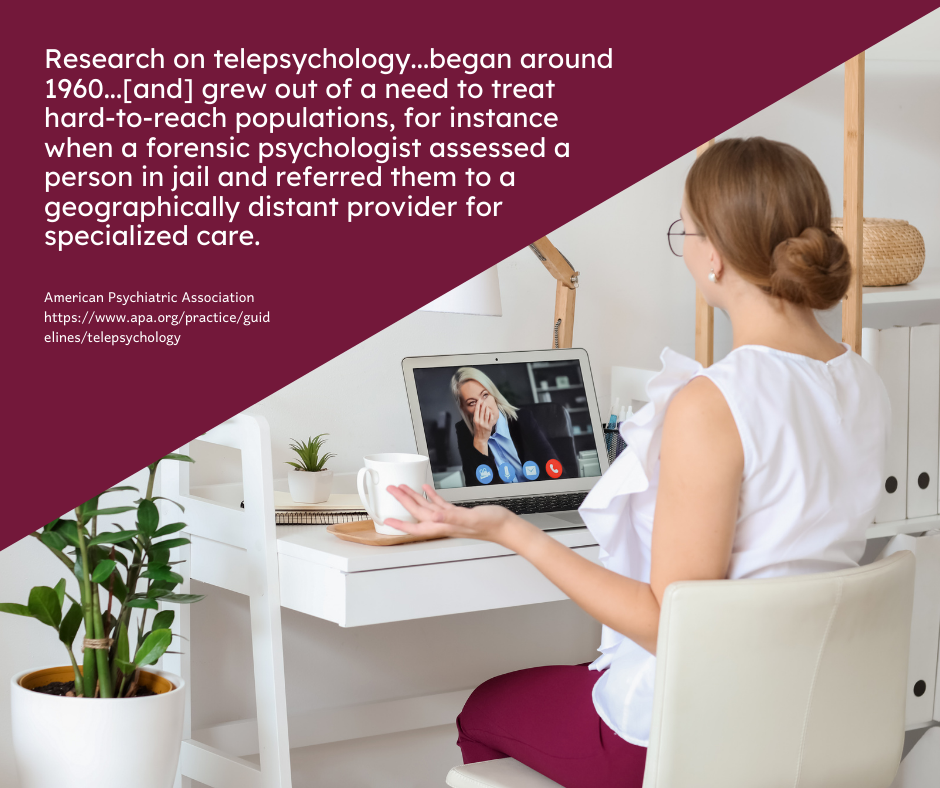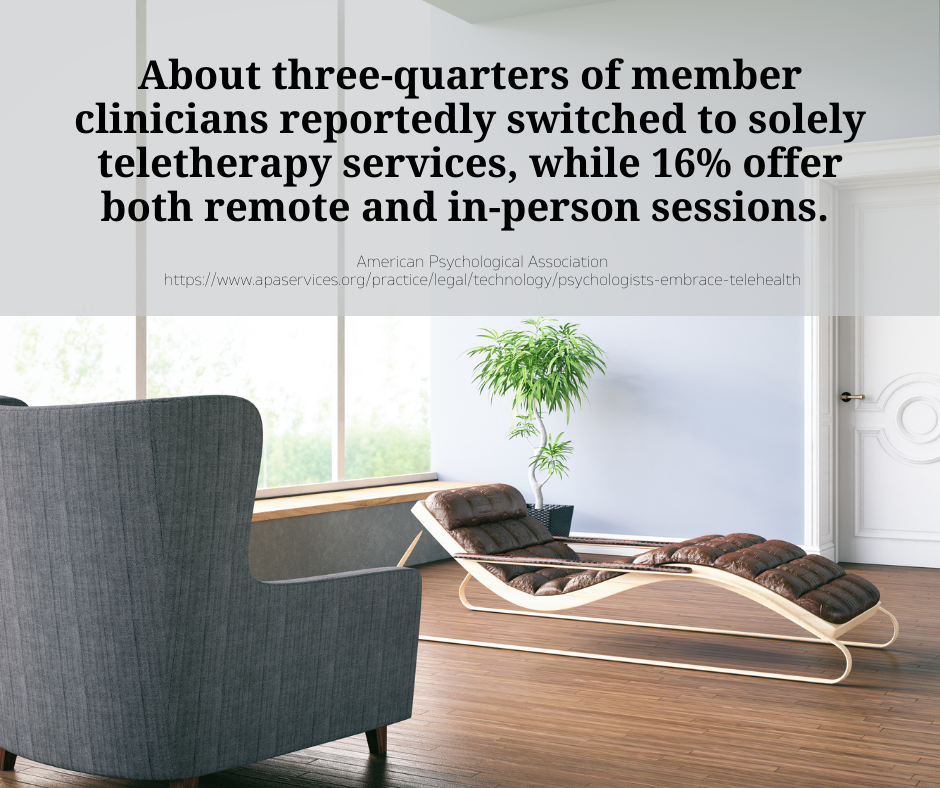Psychology plays an important role in one’s overall mental health. It is primarily responsible for explaining why people act a certain way. This understanding leads to improvement in one’s ability to make decisions, manage stress, and live healthier and better lives.
However, seeking out and consulting a psychologist is somewhat taboo for many communities. This reluctance has varied reasons. Some think that they know themselves better, and talking to a psychologist will not make a difference. There is a concern for expenses since most psychology sessions can be expensive.

Others do not have the time to spare from their hectic schedules as they juggle their professional and personal responsibilities. There is also limited access to mental health care, with many underserved communities finding it difficult to see a psychologist from where they live.
These challenges are ever-present in today’s world, and this is where telepsychology comes in.
Learn more about telepsychology! Explore the topics using these quick links:
What is Telepsychology?
How Does It Work?
Types of Services in Telepsychology
Benefits of Telepsychology
The Downsides of Telepsychology
Telepsychology Best Practices
The Future of Telepsychology

A subset of telehealth, telepsychology allows individuals to gain easy access to therapy without physically attending sessions.
In a nutshell, telepsychology pertains to the available psychology services through video conferencing and other communication and technological tools. The term is also used interchangeably with telemental health, telebehavioral health, online therapy, and virtual therapy. It is one way Americans in need of mental health care can get essential services, especially if they come from a small community, and avoid talking about them seeking mental health care.
Telepsychology goes way back. It first started in the 1950s and gained momentum in the 1960s when mental health care got delivered through videoconferencing. The first videoconferencing in psychiatry took place in 1959 when the Nebraska Psychiatric Institute provided group therapy, long-term therapy, medical student training, and consultation-liaison psychiatry using such a tool. Eventually, psychiatric consultations for children and adults were accommodated by the Massachusetts General Hospital (MGH).
The practice then expanded to many other diagnostic and therapeutic interactions. Boasting the same accuracy and effectiveness as in-person care, telepsychology is also known to save one time, money, and other resources.
In recent years, telepsychology has seen growing acceptance from consumers. But how does it work? Let us dive deeper to understand it better.
Telepsychology uses digital technology and other modern tools to assess, treat, and educate clients about mental health. The technologies that are often in use include but are not limited to telephone, email, videoconferencing, instant messaging, and even virtual reality. The gist is that psychology services are delivered without the use of physical interaction.
It can be delivered in various ways.
- Unguided self-help programs – This web-based service relies on the internet to deliver the service.
- Guided self-help approaches – This internet-based service combines the web-based program with regular contact with a therapist.
- Internet-based therapies – This service makes use of different technologies to provide psychology services. It can be through email, chat, or videoconference.
The differences do not end there. They vary in terms of delivery methods, too:
- Telepsychology can be synchronous, which means the therapy sessions and other services are delivered in real-time using video chat, phone call, or videoconference.
- It can also be asynchronous, meaning interactions with patients can be delayed. The often-used medium is email.
Like other telehealth services, telepsychology services need to be delivered through a secure channel, often teleconferencing interface and software, that ensures privacy and security. All they need is a device like computers, smartphones, and tablets that will allow them to access the telepsychology services for patients.

Psychiatric Appointments
Those who require psychiatrists for treatment can do so through telepsychology. Conditions whose treatments can be facilitated with the use of telepsychology include bipolar disorder and schizophrenia. Psychiatrists specialize in mental health care. They are often tasked to diagnose mental illness and prescribe medication needed for treatment. Their sub-specialization ranges from addiction psychiatry, adolescent and child psychiatry, pain medicine, and sleep medicine, among many others.
To access this service, one usually needs to make an appointment online. Some psychiatrists might be available 24/7, and patients can book one anytime. Others might need to set aside a certain schedule for the session.
Medication Management
Many patients need medication for mental illness. It is an ongoing process that often requires regular consultations with doctors. With telepsychology, patients can receive prescriptions and manage their medication without the hassle of seeing their doctors in person. They can consult with their psychiatrist online and get the prescribed medications.
Medications that one can get prescriptions through telepsychology include antidepressants, anti-anxiety meds, antipsychotics, stimulants, and many more.
Online Therapy
Another telepsychology service on offer is online therapy. It comes in specific service types, such as psychoanalysis, family therapy, couples’ therapy, psychotherapy, and so much more. Patients can access this kind of mental health care remotely without traveling to their therapist’s office. Online conferencing sessions are the norm in this telepsychology service.
Online Group Therapy
Group therapy is often done by gathering participants who experience the same or similar mental disorders. The sessions usually focus on one issue, guiding the group in sharing their stories and providing tips and tools that one can consider. While most group therapy sessions involve group discussions and sharing, others run like a class, where participants are equipped with the coping mechanisms that they can implement in their daily lives.
Telepsychology offers a ton of advantages. Here are some of them.
Accessibility
Mental health care is not exactly a top priority for many communities. It is even worse for remote areas where health information and treatment are difficult to find. Many are not aware of what mental health care options they have, mainly due to limited practices around their area. Most have to travel far and take significant time from their hectic schedule to see a therapist. This often discourages many from seeking out treatment for their mental health problems. With telepsychology, underserved communities can access online therapy and treatment with the help of the internet.
That said, it is not only the remote communities that can benefit from telepsychology. It is also a huge help for people struggling with physical limitations. Individuals with disabilities and housebound find it hard to see therapists in person. Telepsychology provides them with an easy and convenient means to access mental health care.
Convenience
As mentioned before, telepsychology spells convenience. Not only does one not need to travel to see a therapist. They can also get appointments that fit their schedule. It is especially beneficial to work professionals and parents who need to juggle multiple responsibilities both at home and at work. There are telepsychology services that are available 24 hours a day. It eliminates wait times while increasing the availability of appointments.
Effectivity
One study once found that patients suffering from major depressive disorder from both face-to-face and over the telephone have the same treatment outcomes. This means telepsychology is just as effective as in-person mental health care. While treatment effects slightly last longer in the traditional therapy method, they are also shown to drop out of therapy earlier than their remote counterpart.
Safety
During the flu season and, most recently, the COVID-19 pandemic, people have become more aware of safer and convenient mental health care options. Accessing these services remotely minimizes the chance of mingling with the crowd and risks acquiring contagious diseases. The stigma that one feels when it comes to seeking proper mental health care is also significantly lessened.
Telepsychology is not without its fair share of drawbacks. Here are just some of its disadvantages.
Insurance Coverage
Telepsychology is not usually covered by insurance. The coverage largely depends from state to state and the insurance company that one has. This can be a problem for those who attend regular therapy sessions, which must shoulder the fees straight out of their pockets.
State Policies
Some states prohibit access to out-of-state psychologists. Telepsychology providers must have the state license from the state where they operate and where their clients are located. Even so, states allow out-of-state psychologists to provide services for a short period, usually between 10 to 30 days annually.
Privacy and Data Safety
Personal information is a major concern in the telepsychology practice. The way information is being transmitted, stored, and retrieved risks data leaks and hacks concerns. There are also worries about technology problems hampering access to treatment when one needs it the most.
Crisis Situations
Not all mental health problems can be solved by telepsychology. During a crisis, often with a client experiencing suicidal thoughts, online therapists will find it difficult to provide direct and instant assistance. They will not be able to respond as quickly compared to in-person therapists. Some complex problems, such as serious addiction and severe cases of depressions, are out of scope for most online therapy services.

Telepsychology has a set of guidelines to follow to ensure the quality of services being offered. Some of the important things considered for these best practices include practice standards, ethical principles, laws and regulations, and the latest advances and changes.
Competence
Psychology professionals are obliged to provide services that are within the boundaries of their competence. This is based on their education, training, consultation, and professional experience. They are responsible for assessing and evaluating their professional and technical competencies and management practices. They must be competent enough to assess whether a patient is fully able to engage in telepsychology. This means finding out whether their cultural, linguistic, socioeconomic, and health aspects can impact their telepsychology outcomes.
Standards of Care
Telepsychology services must follow the same ethical and professional standards set out for in-patient mental health services. Psychologists and psychologist associates must be able to communicate the potential risks and benefits to patients. It should be supported by documentation in the clinical file.
Informed Consent
Telepsychology services being offered must have complete and clear descriptions. This should include the costs, benefits, and limitations. All of which are important when getting informed consent from the patient.
Confidentiality
Keeping everything between the patient and psychologist confidential is standard practice. Telepsychology providers must set out policies and procedures that address potential threats to data and information safety. There must be a clear process on what data should be stored, how much data will be stored, who can access it, how they can access it, and other vulnerabilities related to technology.
Videoconferencing
Before commencing with videoconferencing, it must be clear that guidelines are put in place. This includes orienting and confirming with patients that they are in a secure environment that will keep their discussions confidential. The platform used must be designed for secure and protected video conferencing, a responsibility in the telepsychology service provider’s hand.

Like other subsets of telehealth, telepsychology is gaining momentum and does not show signs of slowing down. The demand for mental health care will always be present, and telepsychology can fill the gaps where traditional therapies are hard to access.
The pandemic may have thrust telepsychology into the spotlight as a safer alternative to in-person therapy and other mental health care services. Many embraced the convenience of telepsychology as it can easily fit into one’s work schedules and minimize the cost incurred from traveling and cancellation of appointments due to time constraints.
The changes in policies surrounding telepsychology coverage have increased accessibility to services in many parts of the country. If this continues, many people will continue teletherapy and other web-based mental health care services offered by telepsychology.
If anything, there is a clear indication of what the future holds for telepsychology. It could be that we will witness a growing trend of hybrid offerings of telepsychology and in-person services. There is also a huge possibility of providers switching to telepsychology services. Many providers are keeping up with the changing times by adapting to the reality of telehealth.
The American Psychological Association reported that about three-quarters of member clinicians reportedly switched to solely teletherapy services, while 16% offer both remote and in-person sessions.
It would be interesting to see where telepsychology will be five, ten years from now. It will likely stay!
